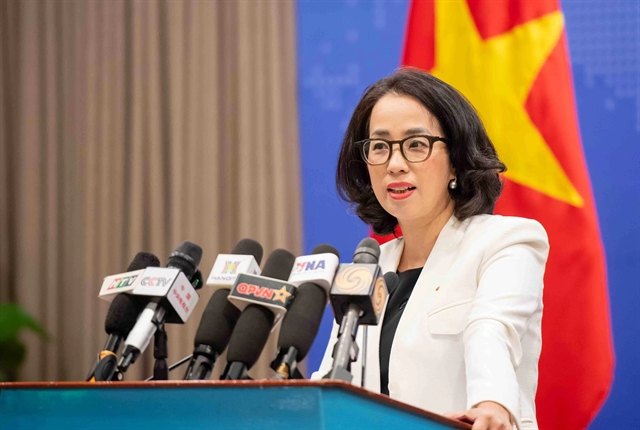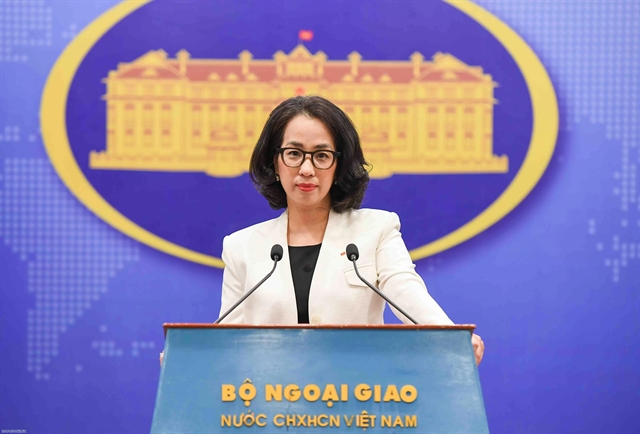.jpg) Politics & Law
Politics & Law


|
| Nguyễn Thanh Hải, Chairwoman of the NA Committee for Deputies' Affairs speaks at the Wednesday' session of the 15th National Assembly’s ongoing 9th meeting. VNA/VNS Photo |
HÀ NỘI — Several lawmakers on Wednesday voiced concerns over the delineation of polling areas, while discussing the draft law amending and supplementing a number of articles of the Law on the Election of Deputies to the National Assembly (NA) and People's Councils.
During Wednesday’s session of the 15th National Assembly’s ongoing 9th meeting, Deputy Nguyễn Văn Huy of Thái Bình Province proposed that the draft law should clearly define the responsibilities of provincial-level People’s Committees in inspecting and supervising the designation of polling areas.
He referred to the report by the NA Committee for Deputies' Affairs, which reflects feedback from previous group discussions. The latest draft stipulates that the delineation of polling areas is decided by the commune-level People’s Committee and reported to the provincial-level People’s Committee. In necessary cases, the provincial authority may adjust those boundaries.
Emphasising the importance of clearly defined polling areas for ensuring voter convenience and electoral integrity, Huy warned that without strict oversight, there could be arbitrary decisions in arranging the number of voters per polling area, which might lead to procedural errors or legal violations.
He agreed that assigning commune-level authorities the responsibility to determine polling areas enhances local initiative, especially within the context of the two-tier local government model.
Still, he pointed out that the current law (Clause 7, Article 4) only broadly assigns election oversight duties to standing committees of the People’s Councils and People's Committees, without specifically requiring them to supervise polling area delineation.
“To ensure clarity and enforceability, I propose the law explicitly assign provincial-level People's Committees the responsibility for inspecting and supervising polling areas,” he said, suggesting that polling areas shall be determined by the commune-level People’s Committee and reported to the provincial-level People’s Committee. The provincial People’s Committee shall conduct inspection, supervision and make adjustments when necessary.”
Sharing a similar concern, Deputy Nguyễn Văn Mạnh of Vĩnh Phúc Province expressed general agreement with the proposed decentralisation. However, he noted the draft law lacks clear criteria for what constitutes a 'necessary case' that would warrant provincial-level intervention.
“This is a vague concept that risks arbitrary application,” he said. He proposed a clearer mechanism, in which commune-level People’s Committees should report their proposed polling area plans to the provincial level and adjustments should only be made either upon request by the commune or for the sake of provincial-level consistency.
Deputy Hoàng Ngọc Định of Hà Giang Province also weighed in, stating that the approval of polling areas is a significant matter that was previously handled by district-level authorities. Given the larger scale of communes after administrative mergers and the geographic difficulties in some regions, he cautioned that provincial-level adjustments might lack precision and pose implementation challenges.
Định recommended that commune-level authorities retain the right to decide polling areas in line with ongoing decentralisation reforms. According to Định, provincial-level People's Committees should focus on issuing general guidance and conducting oversight, rather than directly approving each case, to ensure both consistency and efficiency.
Responding to the concerns, Nguyễn Thanh Hải, Chairwoman of the NA Committee for Deputies' Affairs, noted that prior group discussions recorded eight opinions favouring provincial approval of polling areas and 21 opposing it, in favour of commune-level autonomy.
She clarified that the drafting committee would continue refining the proposal. She also added that the draft law would also define what constitutes a 'necessary case' to avoid inconsistent application across cities and provinces. — VNS

.jpg)







